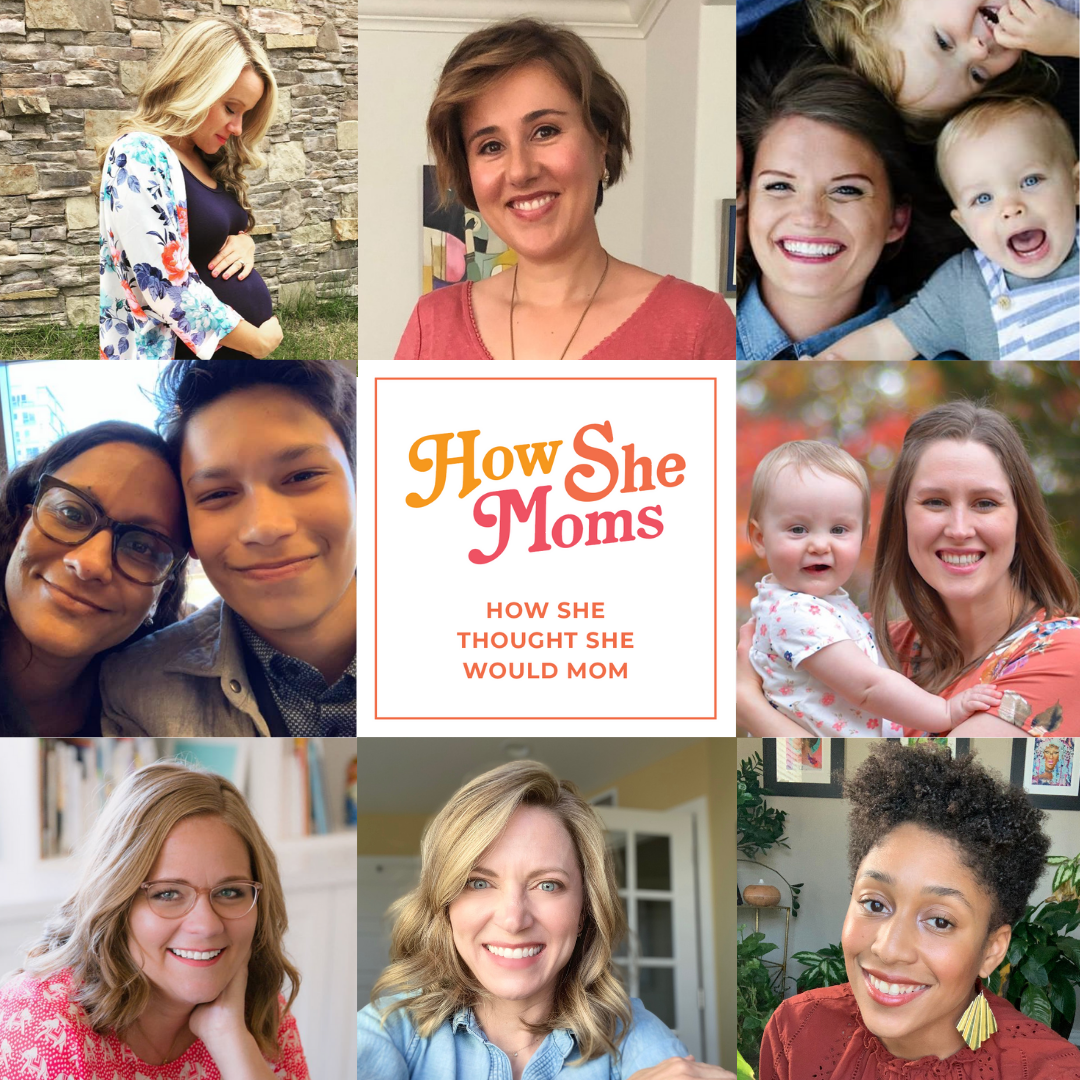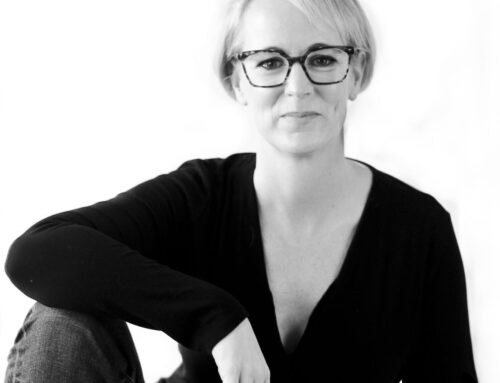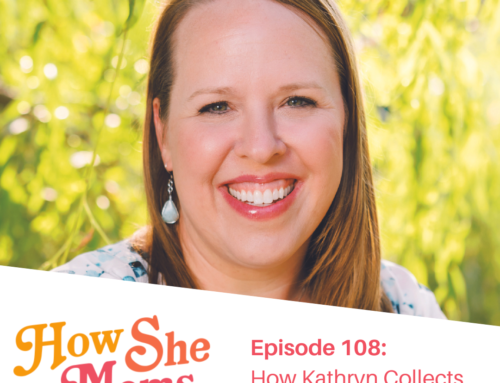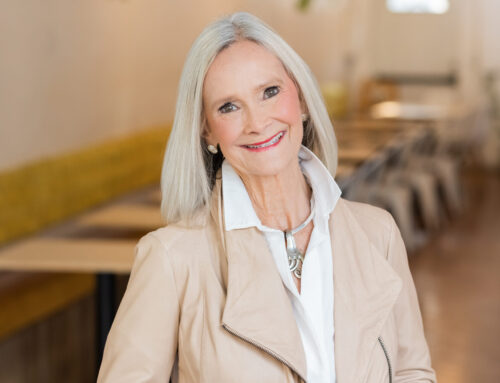I had a whole flock of kids before ever gave birth. My husband and I went through about five years of infertility, and I lived out all my parenting dreams by playing auntie to my friends’ kids. I took them on hikes. I played hide and seek, dressup, and firefighters. I taught them to fingerpaint with pudding. I frequently offered to babysit and then read piles of stories and patiently paced the floor to get them to sleep. I never got mad or frustrated.
I was the perfect mom.
Then I had kids of my own. And despite all the practice with my friends’ kids, and all the books I’ve read, I’m not so perfect anymore. I do many of the things I said I’d never do (hello frozen dinners, too much screen time, and losing my temper) and I don’t do many of the things I thought I would do, like crafting and putting them to bed on time. I teased my mother mercilessly for the crazy outfits we wore in old photos and our disheveled hair, and now my kids easily rival those mismatched ragamuffins in those old photos.
Not only that, but my kids aren’t the kids I imagined. I thought my kids would love school, love each other, love ME. And they do—sometimes.
It turns out, when the rubber pacifier hits the road, we rarely turn out to be the moms we thought we would be—but in so many ways we’re better than those fantasy moms we dreamed up.
As I’ve researched the different stages of motherhood this year, I’ve realized there are many more books about the stages the kids go through than about the changes and stages moms go through. But I have found a few, and one of my favorites is a book written in the 80s called The Six Stages of Parenthood. In it, the author, Ellen Galinsky, identifies the first stage of parenthood as the image-making stage. She says, “Expectant mothers and fathers get ready [for pregnancy] by culling through their images of parenthood. They look back at their own experiences as children with parents. They examine and analyze their friends’, relatives’, and neighbors’ as well as their own experiences as parents.”
This jives with Celeste Davis’s experience as she prepared for motherhood:
I had so many plans. I think I just had a really unrealistic sense of my own ability to control my situation, because in school input equals output. The harder I study, the better grades I get, and the harder I work, the better job I could get.
Then I became a mom, and I was working so hard and my child still wouldn’t listen to me no matter what I did. My old worldview had to crumble, because it wasn’t working. The more I pressured for obedience, the less obedience I got.
I was also just so judgmental before kids, when I was pregnant. I thought, “Oh, my kid would never be the one in the middle of the store kicking and screaming. I would be able to handle that much better.” Or, “My kids would never be the ones to only eat rolls at Thanksgiving dinner. They’re going to eat everything.”
I often think of like, the beginning of my motherhood like this meme of an old-timey mother talking to her kid, saying, “You’re making it very difficult to be the mother, I always thought I would be.”
It’s just been a journey of letting go, letting go, letting go. It’s been a continuous lesson of loving unconditionally, even when your child’s behavior is not as you would prefer it, which is I think the whole point–what I’m supposed to be learning from both motherhood and marriage.
Celeste is now a mom of four, with much more realistic expectations for herself. She is also a terrific writer. You can find her work at her blog, marriagelaboratory.com.
I asked Rachel Neilson, the host of one of my very favorite podcasts, 3 in 30: Takeaways for Moms, about her image-making stage.
Because I was the last of all my friends to have kids because we struggled with infertility, I got to watch a lot of their parenting. And I actually have memories of times when I judged their parenting and thought, “I will never do it that way.”
Now that I’m a mom, I have like flashbacks to these moments when I judged my friends, and I think “Oh, my goodness, I need to call them and apologize,” even though they had no idea.
I have I had a good friend who confided in me that she was feeling down that she yelled at her kids. She never thought that she would yell at her kids. But she did. And she was feeling so sad about it. And of course I listened empathetically, but in my mind, I was like, “What kind of a monster yells at young children?” Her kids were like two and four years old. And I just couldn’t even fathom that she would yell at them. And then years later, as I was losing it on my young children, I thought of that moment, and I thought, “Oh, apparently I am that kind of monster that yells at young children.”
Or I remember I had a friend whose baby didn’t nap very well. And it just always seemed like she couldn’t get it together and get him on a good sleep schedule. And then when I had a baby that was a really hard sleeper that didn’t nap, I remembered how I was sure my babies would take two-hour naps every day. I would have all of this uninterrupted time to work during my baby’s nap times. And of course, I had one baby that was a great sleeper and did that, and the other was a terrible sleeper even though I did the exact same thing.
Janet Thompson, a mother of six, had a similar experience of watching her friends parent their kids and making judgments—and also expecting to have much more control over her kids’ behavior than she actually did.
We talked about how we were going to raise our kid, and we were very deliberate about it all. We had a lot of friends that had kids already. We were the youngest in in the law school. Some of the kids were really good and some were really crazy. And we just were absolutely positive that we were never going to let our kids act like some of those kids. I think I was very idealistic and thought that if I did something it would cause my children to be the way they were supposed to be.
Now, looking back on it, I realized that I was really naïve, because our Heavenly Father has these children, and they’re all different, and, you know, everybody has their own personalities. Now that I’m a grandmother, I just take my grandkids as they come. I’m not trying to change their behavior.
This tendency to judge other moms during this pre-motherhood stage is a common thing among the moms I’ve talked to, myself included. Now I’m not usually in favor of judging other mothers—quite the opposite. But I think there’s an important distinction here. This kind of judgement, as we’re thinking about our impending parenthood can perhaps be more appropriately called evaluation or analysis. And it’s really an important and necessary step to identify our values and priorities for our families.
It’s especially useful to evaluate our own parents and talk with our spouses about what we liked and didn’t like about the way we were raised, and about the differences between our families. Of course it’s even more crucial to do this kind of evaluation if we are trying to break a cycle of abuse or other unhealthy behavior from our own upbringing.
As we piece together these ideas of what kind of parents we will be, we often make absolute statements like, “I will never yell at my kids,” or “I will always make sure my kids’ hair is brushed before church.” Words that are destined to be eaten.
I asked the wonderful moms on the How She Moms Facebook Group when they’ve had to eat their words and I got some great responses.
Alisa Stacey said, “I thought I would read to my kids, and I found out that reading anything more than picture books aloud is something I dread. Also crafts, I thought I would do that too. Crafts drain me of energy.”
My neighbor Van Oberly swore she would never by licensed clothing for her kids. They’d always be dressed to the nines like little adults. But, she says, “as soon as they showed any joy in any character, there went my bank account.”
The most common pronouncements people talked about making were about food and screentime. Here’s Katherine Greissman:
My kids were not going to eat chicken nuggets and french fries. We were going to eat all this healthy food, and not have much screen time. But now, especially with a kid who doesn’t eat because she has some sensitivities, I get excited when she eats chicken nuggets! I got her to eat Nutella on a tortilla, and I was over the moon.
We’re working on the screen time, she definitely gets less now. But we use it as a tool for feeding a lot of the time, for distraction, because we couldn’t get her to eat. And so we had we use that or sometimes read her books, but she definitely got a lot more screen time than I ever thought that I would do. And you know what–she’s okay. So far anyway!
And here’s Maris Young, host of the podcast Young Honest Mother:
Before I was a mom, I thought, “I’m not going to let my child be in front of a screen and just watch shows. I’m going to be very hands-on and always be there to entertain and make sure that he has all these activities.”
And I was that way for a while. But I really burned out on trying to be everything for him all the time. My son’s screen time started out very hesitantly. He saw this video when my mom was on her iPad. And he like pointed to it. He wasn’t speaking full sentences at that point. And it was one that was teaching about colors and shapes and things like that. I was like, well, that’s educational, that’s a show that he can watch.
We still try to be intentional about how much and what he watches, but we’ve noticed that our son is like an actor. He remembers the lines from things and will just say them in conversation as we’re talking about breakfast, and he repeats them word for word, with the intonation, with the mood and the tone and the movements and everything.
We realized that he wants to watch the same movie over and over and over again. And each time he picks up a new scene. And then he’ll perform that throughout the week.
I realized that I was the one who was being so rigid with this expectation that I was imposing on myself. And relaxing and letting up on that a bit has really shown me that you don’t have to have such an intense approach to screen time. It doesn’t have to be demonized. We can make of it what we can and we can set boundaries around it. But I wouldn’t have seen the performance side of him had I not introduced screen time. And I think it’s definitely bringing out more of his personality.
Juliana started her image-making stage way back in high school:
When I was a teenager, I thought I would be such a cool mom. I remember loving to listen to loud music when I was getting ready. And my mom would always get mad and tell me to turn it off. And now that I’m a mom, I’m eating my words and I really appreciate having some moments of quiet and not constantly having all the noise in our house. I also thought it would be super easy to talk to my kids about sex it would be no big deal. I wanted to have open conversations. And the first time I talked to my daughter about it, I was embarrassed, I was tripping over my words, I was super nervous about what to say. And I’m realizing that being a mom is a lot harder than you think when you’re a teenager.
Raj Petersson swore she would never overreact like her parents did about grades:
My parents used to freak out if I got like a 98 on something. They’d say, “What happened to the other two points?” I was never going to do that. But now I catch myself having the same thought, because I think we all have our parents in us. But I do catch myself at least, and try to try to avoid being extreme.
The problem with all these pronouncements, of course, is that we have no idea how challenging motherhood will actually be. And of course, we’ve never even met the kids we’ll be parenting.
This is the realization that has helped Devon Smiddy readjust her expectations.
I thought my children would be mostly like my husband and I, with our character and personality. My husband and I are very similar. We’re both very organized. We’re tidy. We’re rule followers. So whenever I thought about our hypothetical kids, it was always in this context of imagining them like us.
And then they’re not at all!
So I’ve had to adapt my own expectations and thoughts about what we would or wouldn’t do, to who they are, and letting them be who they are versus who I always imagined they might be.
I had a lot of expectations around what my kids would eat, or I would allow my kids to eat or not eat. Before kids, I really thought kids just learn to eat based on what you give them. So if you never give them Cheetos, then they just won’t even know that that’s an option. And then they won’t crave it all the time. Or if you don’t give them the choice of mac and cheese, then they’re going to eat your salmon because they’re not going to go hungry. Wow, have I really been humbled. I’ve eaten my words with what my kids eat, for sure.
I’ve also had to adjust my expectations about their level of involvement and behavior around other people. I thought they would be charming and engaging and super friendly. But one of my kiddos in particular is not wired that way. We obviously maintain like a baseline expectation about manners and all of that kind of thing. But I’ve had to really check my expectations and figure out how to honor who my kid actually is and where their boundaries and comfort zones are, and still help them have a relationship with their long-distance grandparents, for example, or make sure that they can still be polite to the hostess. I don’t think you can appreciate how different kids can be until you have multiple kids.
Devon is a mother of one girl and one boy, and coaches parents of highly sensitive kids, with Megghan Thompson Coaching.
Not only do we know nothing about our individual children ahead of time, we don’t even really know what the world will look like as our children grow. I swore my kids would not have cell phones until they were at least 16. It just seemed so unnecessary and even hazardous with smartphones and social media etc. Then my oldest hit middle school and I realized that I wanted to be able to reach him, and I didn’t want him using my phone to text and call his friends. Plus, by the time I decided it was time to let him have a smart phone, technology had improved so I can block web browsers and choose exactly what apps he has and how long he can use them.
There are just way too many unknowns to make any kind of blanket statements about what we will and will not do as parents.
Ellen Galinsky talks about this in her book too, how once we actually become mothers, we have to reconcile the images with reality. And that process can be hard, as Andrea Quimby, currently the mother of one toddler, has learned:
I wasn’t the mom I thought I was going to be. I’m still not, really. It turns out I’m a little bit different than what I thought and I’m still kind of working through being okay with that.
It can be an actual grieving process to bury that image we had of the kind of mom we thought we would be and then start actually becoming a real mom.
For Katherine Greissman, a mom of one daughter and a family therapist, this started right at her daughter’s birth:
I had always wanted to breastfeed. My mom breastfed all her kids, my (ex) mother-in-law, breastfed her kids. And they both had six kids, five kids, all natural—these strong woman who just pop out these babies and your body can do it. I just wanted that experience.
But from the birth on, nothing was how I had expected it to be in this story that I had told myself and that was reinforced by all the people around me.
I didn’t have a natural birth. I made it seven and a half hours. I had gone into labor right at midnight, and I was I was sick and rundown. And I had worked right up until the day I went into labor, and I shouldn’t have done that. But I was so determined not to use any of my precious maternity leave days off before my baby came.
Not only that, but I was still a social worker in oncology, and I had a kid on my caseload dying in hospice that day, and I had nothing left to give. I was so drained. My water popped right at midnight. I hadn’t had any contractions prior that, and it was like getting hit by a bus. So I made it until 7:30 in the morning, and the midwife came in, and the exact words I said were, “I’m in despair. I need help.”
So the anesthesiologist came in, and I got an epidural. And then she wasn’t born until 1:30, the next day. I would have never made it, I was so exhausted.
But there was so much grief. I had to grieve that because I put all this pressure on myself. I wanted to experience this beautiful, natural birth. That was my story. “Don’t be weak. You got this! Women do this every day, they have babies in cornfields!”
It sounds silly now, four years later, but that was incredibly hard for me. And then she couldn’t eat, because she had a lot of oral motor sensitivities. But I didn’t know that. I was a young new mom—I’d never had a kid. I thought you just put them on the boob and they eat and it’s beautiful and amazing. And then you just carry this baby around and feed them wherever you want. It’s a piece of cake.
But it was it was a horrible for me. I felt so inadequate, like I couldn’t feed my baby. And the reality was I could feed her, just not the way that I had wanted to. But I couldn’t let that go in those moments. I was so postpartum—I was out of my mind. So sleep deprived! I finally realized several months in that I was grieving. And I gave myself permission to just grieve and be sad about it. Then at that point, I think I could finally move on. And I just I stopped trying to nurse her. I still pumped exclusively until she was 10 months old. I wanted to make it a year but I just didn’t have enough milk, the pumping just didn’t do it.
But when I finally just let myself grieve that loss, that expectation that I had that it was going to be this beautiful thing to feed my baby, I was able to move on a little bit. But there was so much grief in the joy. And it was so hard. I wasn’t prepared for that at all.
Luckily, this image-making stage and the subsequent reality check gets less dramatic with more experience. Here’s Devon Smiddy again.
I’m so type A. I read all the books and earmarked pages of everything like nursing and nap schedules. And I was really clinging tight to the idea that if I just have the right information and do the right things, this will all go smoothly. And that’s not true. I was making myself miserable trying to control that.
So that made my first six months with my first kid a lot less enjoyable, too. I chose to have these really high expectations for myself, and then I couldn’t live up to them. So I was constantly being disappointed in myself.
But then my son came very quickly, so I basically had two babies at one time. He had a lot of medical issues right out of the gate, which seems like it would have been really hard, but it was actually such a blessing, because it forced me to let go of control. He had to go to a specialist doctor an hour away twice a week for special bloodwork. He needed all of this extra care. And so my nap schedule that I had highlighted out for my daughter just wasn’t going to happen.
I had to give myself permission to just let some stuff go that I didn’t give allow the first time around. And so I enjoyed his infancy like so much more. I was like, “Okay, you know what? The house is not going to get cleaned. He’s not going to wear super cute outfits every time we go out. We’re just not going to go out very often because I just can’t even get myself dressed.”
I just let go of so much more and it made the whole ride so much more enjoyable. That’s what I wish I had known going in. That and they’ll be fine. I think that’s where this like started from was you saying how resilient they are? It’s like, they’re gonna be fine. Whether they take that nap, perfectly swaddled in their own crib, or they take it in a car seat at soccer practice, or they don’t take it. They’re fine. They’re going to be fine. You’re not even going to remember six months from now. Yeah, when they first rolled over or under therapy for that. Right? It’ll be fine. Everything’s gonna be okay.
I want to leave this episode with that message. You won’t mother exactly like you imagined, and that’s a really good thing. You’ll be a real mom with real mistakes and real successes. Your kids will be real kids who also make real mistakes and you get to learn and grow together, whether you eat lima beans and crank up the music together or not.











Leave A Comment